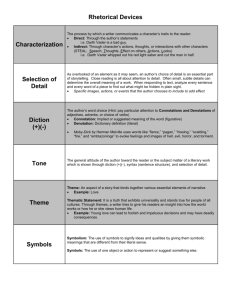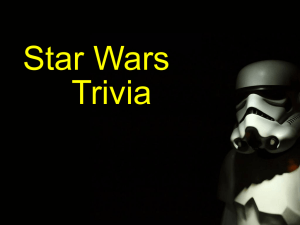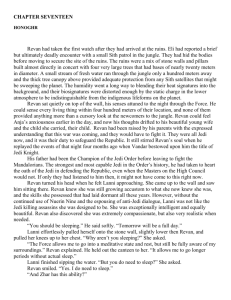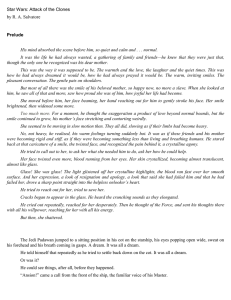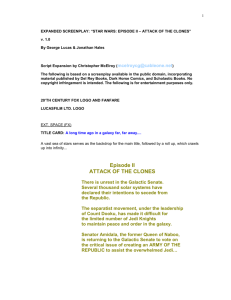It`s So Easy Being Evil - Star Wars and the Dark
advertisement
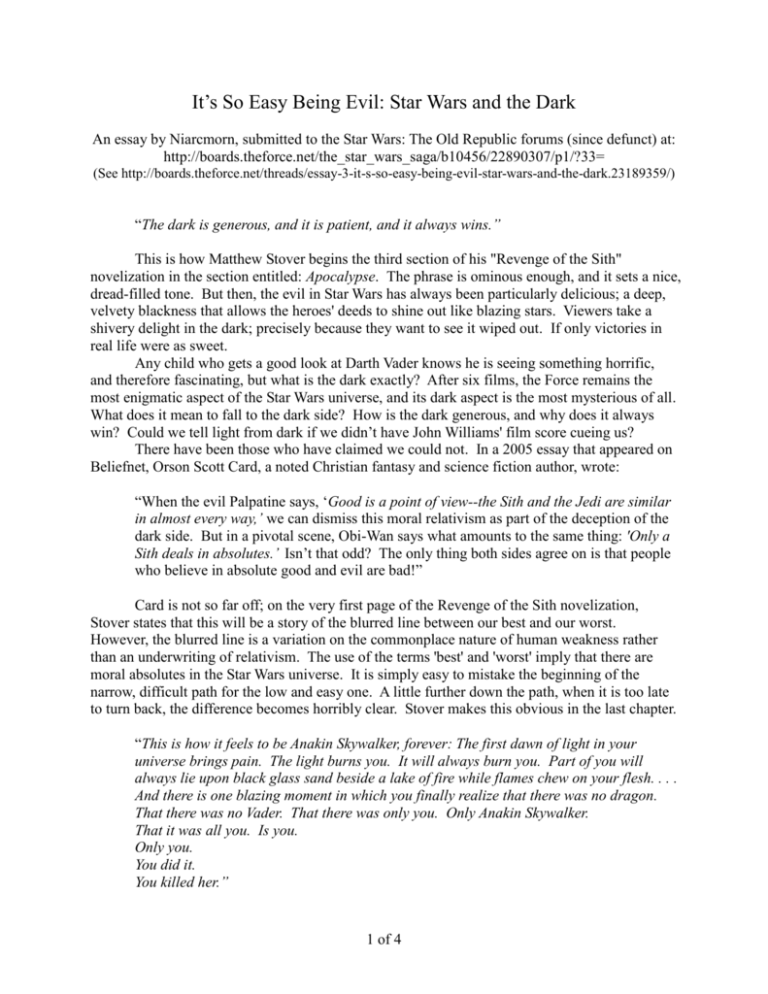
It’s So Easy Being Evil: Star Wars and the Dark An essay by Niarcmorn, submitted to the Star Wars: The Old Republic forums (since defunct) at: http://boards.theforce.net/the_star_wars_saga/b10456/22890307/p1/?33= (See http://boards.theforce.net/threads/essay-3-it-s-so-easy-being-evil-star-wars-and-the-dark.23189359/) “The dark is generous, and it is patient, and it always wins.” This is how Matthew Stover begins the third section of his "Revenge of the Sith" novelization in the section entitled: Apocalypse. The phrase is ominous enough, and it sets a nice, dread-filled tone. But then, the evil in Star Wars has always been particularly delicious; a deep, velvety blackness that allows the heroes' deeds to shine out like blazing stars. Viewers take a shivery delight in the dark; precisely because they want to see it wiped out. If only victories in real life were as sweet. Any child who gets a good look at Darth Vader knows he is seeing something horrific, and therefore fascinating, but what is the dark exactly? After six films, the Force remains the most enigmatic aspect of the Star Wars universe, and its dark aspect is the most mysterious of all. What does it mean to fall to the dark side? How is the dark generous, and why does it always win? Could we tell light from dark if we didn’t have John Williams' film score cueing us? There have been those who have claimed we could not. In a 2005 essay that appeared on Beliefnet, Orson Scott Card, a noted Christian fantasy and science fiction author, wrote: “When the evil Palpatine says, ‘Good is a point of view--the Sith and the Jedi are similar in almost every way,’ we can dismiss this moral relativism as part of the deception of the dark side. But in a pivotal scene, Obi-Wan says what amounts to the same thing: 'Only a Sith deals in absolutes.’ Isn’t that odd? The only thing both sides agree on is that people who believe in absolute good and evil are bad!” Card is not so far off; on the very first page of the Revenge of the Sith novelization, Stover states that this will be a story of the blurred line between our best and our worst. However, the blurred line is a variation on the commonplace nature of human weakness rather than an underwriting of relativism. The use of the terms 'best' and 'worst' imply that there are moral absolutes in the Star Wars universe. It is simply easy to mistake the beginning of the narrow, difficult path for the low and easy one. A little further down the path, when it is too late to turn back, the difference becomes horribly clear. Stover makes this obvious in the last chapter. “This is how it feels to be Anakin Skywalker, forever: The first dawn of light in your universe brings pain. The light burns you. It will always burn you. Part of you will always lie upon black glass sand beside a lake of fire while flames chew on your flesh. . . . And there is one blazing moment in which you finally realize that there was no dragon. That there was no Vader. That there was only you. Only Anakin Skywalker. That it was all you. Is you. Only you. You did it. You killed her.” 1 of 4 But if this is an unequivocal vision of hell as we’re likely to get in secular literature, what are we to make of Card’s further charges of relativism? The Jedi may claim to be in favor of democracy, but in fact they function as a ruling elite, making their decisions among themselves. They occasionally submit to the authority of the legislature, and they seem to respect the rule of law, though whose law it’s hard to say. By and large, however, they decide among themselves what they’re going to do and when it’s OK to break the law and defy the civilian authority. None of their discussions as a council are devoted to considering what is right and wrong. Card would have us believe that George Lucas has failed to understand his own saga, and painted himself into a logical corner. Could that be true, or does the dark have another meaning beyond political and religious practices, beyond even characters’ choices and murky, ambivalent motivations? If not, then the mythos that drives the saga is in serious trouble. We can’t reliably look to characters’ actions as a compass pointing toward or away from the dark. If Anakin’s dispatching of the unarmed Dooku was an error, what are we to make of Mace Windu’s refusal to allow Palpatine to stand trial? The rationale given, once by a Sith, and once by a Jedi, is the same: He’s too dangerous to stay alive. We can’t look to emotions, values, or motivations for guidance either. Luke’s love for his sister nearly damns him: “If you will not turn to the dark side, then perhaps she will”, while his love for his father saves him. Obi-Wan’s refusal to take action on Anakin’s premonitions about Shmi seems short-sighted, even cruel, but Anakin’s swift response to his premonitions about Padme result in an even worse situation. Qui-Gon stakes everything on his belief in Anakin, and democracy ends. Luke stakes everything on his belief in Anakin, and democracy begins again. What is happening here? If we can’t rely on character action, motivation, or statements to point us toward (or away) from the dark, how do we know when we’ve found it? More to the point, how do we know when we’ve avoided it? Such confusion is worse than relativism, which at least allows that different beliefs may be true for different people. The Jay and Silent Bob Effect (a re-reading of the story in a light that utterly collapses the distinction between hero and villain) turns Star Wars from a simple children’s morality tale into an existential quagmire. The way out of this mess is to look outside the characters of Star Wars and their personal moral dilemmas. In fact, you must look outside Star Wars altogether. “The dark” is not a fantasy concept invented by George Lucas which has meaning only so long as his storyline holds together. The dark is real. Stover says as much in the opening of his novel. “A strange thing about stories Though this all happened so long ago and so far away that words cannot describe the time or distance, it is also happening right now. Right here. It is happening as you read these words.” The dark is not a decision, or a value system, or an emotion. The dark is totality. The dark is the changeless, timeless void that will exist when the universe is finished. So long as there is life in the world, there will be change and growth--as well as loss, the shadow-side of change and because of this, we never see the full scope and power of the dark. The closest you can come to really seeing the dark is to die, and by then there’s nothing left of you to see. In death, there is no change, no growth, and no loss. Dead things are complete and 2 of 4 finished, that is to say, they are perfect. Nothing ever erodes death, or shapes it into something other than it is. ”It is already over,” as Stover puts it, “nothing can be done to change it.” Its power is absolute. Death in itself is not evil, and neither is a living being’s wish to control, contain, and delay it. It’s not evil to fantasize about defeating it completely, and winning immortality. If these things were evil, then we would all be Darth Vader. The problem is that since death is absolute, there is nothing outside of its power. Even if you have tremendous, unearthly power, there is no high ground on which to stand and attack it. Death is the end of all things, even attempts to stand and fight death. Death is the constant, like the speed of light. Only in this case, it is the speed of dark. (Actually, darkness flees from light at exactly the speed that light chases it, so it would be perfectly fair to measure all time and motion by the speed of dark.) In a world without hyperdrive, lightspeed is the fastest you can travel, and even to do that, you must *become* light beforehand. Likewise, a person seeking the power of totality can do no better than to catch up with the speed of dark. In order to do that, he must *become* the dark. Death cannot be defeated, but it can be equaled by becoming death. It is the choice to become death: to gain power entirely at the expense of others lives, to arrogantly and selfishly attempt to swallow the whole world and keep it indefinitely, that defines the Sith. Joseph Campbell, one of George Lucas’ major influences, describes the idea in his book, The Hero With A Thousand Faces. Instead of naming the would-be world-swallower a Sith, however, he calls such a character Holdfast. “For the mythological hero is the champion not of things become but of things becoming; the dragon to be slain by him is precisely the monster of the status quo: Holdfast, the keeper of the past…He is Holdfast not because he keeps the past but because he keeps." This is where Anakin’s longing to stop people from dying leads him. In his attempt to seize control of the universe itself, he becomes great and conspicuous in the seat of power; he is enemy, dragon, tyrant, because he turns the authority of his position to his own advantage Lucas is unequivocal about the nature of Anakin’s weakness. In a Time Magazine article printed at the time "Attack of the Clones" came out, Lucas was quoted as saying: “He turns into Darth Vader because he gets attached to things…He can't let go of his mother; he can't let go of his girlfriend. He can't let go of things. It makes you greedy. And when you're greedy, you are on the path to the dark side, because you fear you're going to lose things, that you're not going to have the power you need.” Or, as Palpatine put it, such a person becomes “so powerful, the only thing he [is] afraid of is losing his power.” That ugly mixture of power and fear is the essence of what it means to serve the dark. Fighting such a person is exceedingly difficult, since he has allied himself with the power that always wins. Yoda discovers this, too late, at the end of the Revenge of the Sith novelization. “He, the avatar of light, the Supreme Master of the Jedi Order, the fiercest, most implacable, most devastatingly powerful foe the darkness had ever known . . . just didn’t 3 of 4 have it. He had never had it...He had lost before he was born…How could one win a war against the dark, when war itself had become the dark’s own weapon?" It takes more than twenty years for that question to be answered. Campbell explains the key with accuracy, if not great lyricism: "The tyrant is proud, and therein resides his doom. He is proud because he thinks of his strength as his own; thus he is in the clown role, as a mistaker of shadow for substance; it is his destiny to be tricked. The mythological hero, reappearing from the darkness that is the source of the shapes of day, brings a knowledge of the secret of the tyrant’s doom. With a gesture as simple as the pressing of a button, he annihilates the impressive configuration.” In Luke’s case, the pressing of a button is literal; he turns off his lightsaber and tosses it away. Years earlier, and just hours before Luke’s birth, Yoda discovered that one cannot fight a Sith, for the same reason we earthlings cannot catch up with the speed of light. In fusing themselves with death and the darkness, the Sith had attained the universe’s power constant. Becoming more powerful was impossible; even becoming as powerful as the Sith would mean joining them in their union with death. However, there is one thing Luke can do that the Sith and their all-powerful ally, the dark, cannot do: he can lose. By sacrificing himself, by surrendering even his desire to protect his friends and beloved sister, Luke gives away everything he has. He has essentially chosen death, the source of the Sith’s power; but he’s done so by giving himself to the universe, not by trying to suck the entire universe into himself. In this way, he enters totality by the back door. The Sith have one weakness-the fear of losing their power. A Jedi not only does not fear this, he gives his power away freely, as old Ben did during his last fight with Vader. Such an act makes a Jedi “more powerful than you can possibly imagine.” Jedi, too, can be united with the power that causes all things to arise and to fade, but their connection to it is not brittle. They can be beaten down a thousand times, and still get up and prevail on the thousand and first. A Sith, by contrast, must win every single battle or he loses his claim on totality, and ceases to be a Sith. Stover puts it more poetically than Campbell: “The dark is generous, and it is patient, and it always wins. But in the heart of its strength is its weakness: one lone candle is enough to hold it back.” Luke’s act of self-sacrifice does not give him the power to cut Palpatine down; only his father, the once and future Chosen One, can do that. However, Luke’s act gives him the power to do what no one else, not even Padme, was able to do: thaw Anakin Skywalker out of the ice of Darth Vader. Anakin is at last able to fulfill his destiny, and, like all savior-figures, quickly returns to the source of the power that sent him into the world. The darkness Vader served has a name, and is real. Real people sometimes choose to serve it, although none of them have Anakin/Vader’s command over the laws of physics. The moral dimension of the saga only makes sense if you keep the power of the real darkness in mind. Of course, the power that united father and son and allowed them to destroy the tyrant Holdfast also has a name, and is also real. The words compassion, self-emptying, and selfsacrifice have all been used to describe it. Generally, however, it goes by the name: love. “Love is more than a candle. Love can ignite the stars.” 4 of 4
![A_Starwars_Mitosis_Story[1]](http://s2.studylib.net/store/data/005411969_1-59fd601491bdbe0582a0f55a79807db6-300x300.png)

